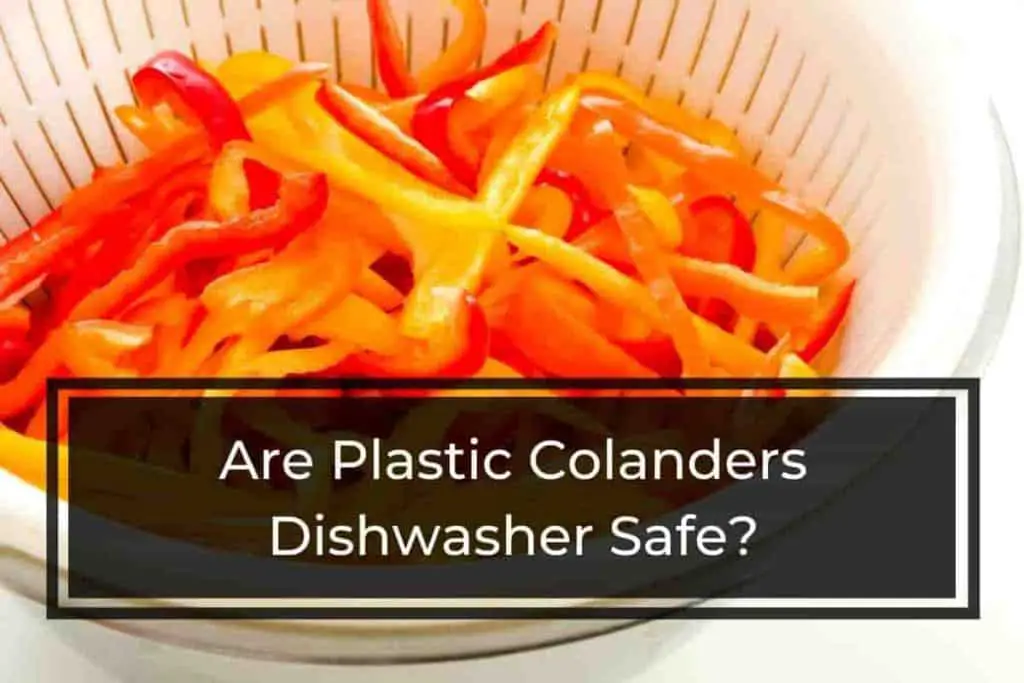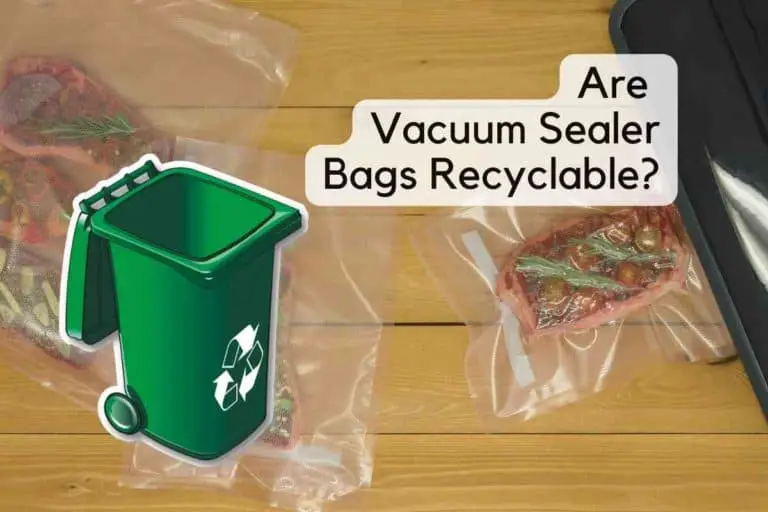Are Plastic Colanders Dishwasher Safe? [How To Wash Them]
Plastic colander is a helpful kitchen utensil commonly used to wash vegetables and food. I was curious about the different cleaning methods the plastic colanders, and one of the simplest was the dishwasher. So I researched online to find out whether putting them in the dishwasher is effective or not.
Are plastic colanders dishwasher safe?
Plastic colanders are usually dishwasher safe, but ensure to check the dishwasher-proof label before putting them in the dishwasher. Otherwise, a plastic colander may melt due to hot water in the dishwasher. Some experts recommend that you should wash the colanders by hand to extend their longevity.
If you have trouble washing the colanders, keep reading to learn whether you should wash plastic colanders by hand or in the dishwasher, how plastic colanders are made, and some helpful care tips to remember when using plastic colanders.
If you are interested in checking out the best plastic colanders, you can find them on clicking here.

Can You Put a Plastic Colander in the Dishwasher?
Yes, you can put a plastic colander in the dishwasher. You may want to do this if the colander is very dirty and you don’t want to hand wash it.
Be sure to check the dishwasher’s manual to see if there are any special instructions for washing plastic items.
How Safe Are Plastic Colanders in the Dishwasher?
Even if you can wash your plastic colanders in the dishwasher, some cooking experts suggest that you should avoid doing it. Because your colanders may get damaged due to hot water and abrasive dishwasher detergent, more significant food bits from other utensils can get stuck in the colanders.
However, some brands claim that the plastic used in their colanders is heat and stain-resistant. To help you understand how to wash plastic colanders, here are a few things you need to know.
Plastic Type
The plastic colanders are typically made from high-density polyethylene or polypropylene plastic. Further, the plastic used in plastic colanders is food-grade BPA-free plastic so that it does not react with your food and does not contaminate it.
Colander Design
Plastic colanders are designed to be sturdy and secure to hold food safely, and their holes are not very spacious that food slips through them and not very small that liquids cannot get through them with ease. Further, the plastic colanders have a smooth interior so that delicate foods cannot get bruised or burst.
Dishwasher Proof
A dishwasher is a hassle-free and quick way to clean plastic colanders. However, if your plastic colander is not heat-resistant and stain-resistant plastic, it can melt and get stains in the dishwasher. Therefore, always check the dishwasher-proof label at the bottom of the colander or outside the packaging.
Are Collapsible Plastic Colanders Dishwasher Safe?
The collapsible plastic colanders can quickly go in the dishwasher and are safe to wash. But make sure to check the dishwasher-proof label to avoid any consequences. Moreover, collapsible plastic colanders are a handy tool, and a dishwasher is a convenient way to clean them.
However, I recommend washing the collapsible plastic colander by hand to get better results. In the dishwasher, you may not get the best cleaning results due to the collapsible feature of the colander.

You can find this Enido Collapsible Plastic Colander on Amazon by clicking here.
How Long Should You Leave Plastic Colanders In The Dishwasher?
It would be best if you do not leave your plastic colanders in the dishwasher for longer hours. You may leave them in the dishwasher overnight or for a few hours if they are dishwasher-proof. But once they are washed, remove them from the dishwasher to maintain their quality.
Are Colanders Made from Materials Other Than Plastic?
Colanders are usually made from silicon, ceramic, or enamel. Furthermore, metals, including cast iron, stainless steel, copper, aluminum, etc., are also used to manufacture colanders. Nevertheless, the material should be food grade.
However, you may have to use them mindfully because you cannot utilize some of these materials (enamel, aluminum, copper, etc.) for acidic foods.
How Does Usage of Plastic Colanders Affect Cleaning?
The colanders are a smart purchase when you regularly cook a variety of foods. Because you can use colanders to wash and rinse stuff (vegetables, fruits, lentils, or whatever), drain canned items (fruits, beans, vegetables, etc.), steam food, strain yogurt and cheese, strain rice, etc.
The purpose of colanders is to drain liquid away while retaining the solid food inside. However, they are also perfect for growing sprouts, keeping bugs off food, preventing grease splatters, and keeping delicate food fresh.
Further, the colanders cannot only strain liquids away from the ingredients, but you can also use them to separate soft ingredients from the more prominent components to maintain their texture.

If you are interested in this KitchenAid Classic Plastic Colander, feel free to check it on Amazon here.
How Do You Clean The Plastic Colanders By Hand?
You can clean a plastic colander by hand, which is the most effective method. Here are some steps to help you accomplish this task.
- Use a soft sponge or toothbrush to remove any food residue from the holes of the plastic colander. You can also use a kitchen towel to scrub your colander while rotating the colander till the debris is flushed away wholly.
- If your plastic colander has stubborn food residue, soak it in soapy and lukewarm water for around 30 minutes. Then wash it.
- Wash your plastic colander with warm soapy water, rinse it thoroughly from both sides, and dry it completely before storing.
Care Tips for Plastic Colanders
Here we have compiled some care tips for you when using plastic colanders.
- Do not put plastic colanders on the hot surface, or they may melt.
- Wash your colanders immediately after using them so that any residue does not dry on the colander, making the cleaning process difficult.
- If you think your food can stick in the holes of your colander, you can line your colander with a coffee filter to avoid it.
- Try not to use your plastic colanders for acidic foods.
- Please refrain from using any abrasive pads to clean your plastic colanders, or you may scratch them.
- Dry your colanders after washing; otherwise, the plastic colanders can get water stains, and metal colanders may catch rust.
- Make sure that your colanders do not have any coating or enamel material.
- If you use your colander inside a pot over boiling water, make sure it consists of heat-resistant plastic or other heat-resistant materials (i.e., aluminum, cast iron, stainless steel, etc.).
Final Thoughts
To wrap it up, one can say that plastic colanders are a great addition to your kitchen because they are durable, sturdy, and dishwasher safe. However, some chefs think it is more efficient to wash them by hand to make them last for an extended period.
After cleaning or draining vegetables, fruits, or pasta, their elongated holes allow water to drain quickly from them. After being rinsed, it is essential to wash these colanders since dirt can build up inside their holes.
In this post, I tried to cover some additional tips for maintaining the quality of plastic colanders. This article provides you with some helpful information regarding plastic colanders.
If you want to see the latest kitchen knives and cutlery that are popular right now, be sure to visit my Recommended Products Page (click to see my page) Which includes all of my top picks by category.
FAQs:
Can You Put a Colander in the Dishwasher?
Are Colanders Dishwasher Safe? Most colanders are dishwasher safe, but it’s best to check the manufacturer’s instructions to be sure.
Can You Put Plastic in the Dishwasher?
Plastic items can typically be washed in the dishwasher, but it’s important to check the item’s label or manufacturer’s instructions to ensure they are dishwasher safe.
Can Strainers Go in the Dishwasher?
Are Strainers Dishwasher Safe? Many strainers are dishwasher safe, but it’s important to check the manufacturer’s instructions or label to be sure.
Are Plastic Colanders Safe?
Plastic colanders can typically be washed in the dishwasher, but it’s important to check the item’s label or manufacturer’s instructions to ensure they are dishwasher safe.






